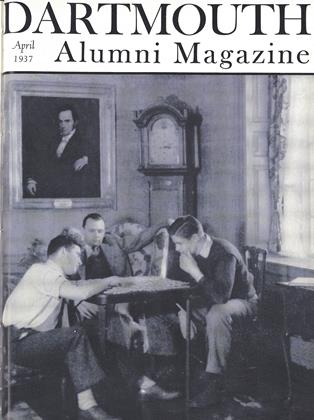Argentina by J. Fred Rippy; Brazil by Percy Alvin Martin; Chile by Isaac Joslin Cox '96. Edited by A. Curtis Wilgus, Washington, D. C., The George Washington University Press, 1935. p. 481.
For any one who is already initiated in the general history of Hispanic America and who wishes to go on to more comprehensive studies, there would be no more profitable pursuit than to read the history of Argentina, Brazil and Chile in terms of our contemporary vision; to find out what American scholarship of today thinks of the period of democratic experimentation in the so-called ABC States. The present volume offers just such a study. It brings together the series of lectures delivered at the third Seminar Conference on Hispanic American Affairs, held annually for advanced students during the summer session at The George Washington University.
Professor Cox's contribution—with which this bibliographical note is chiefly concerned—forms the last third of the volume. He is the chairman of the Department of History at Northwestern University and devotes his teaching to Hispanic American civilization. The first studies in his career as a historian covering the early relations between Spain and the United States in the north and southwest frontier urged him on perhaps to inquire into further aspects of the Hispanic world. His later researches deal with the relations of the United States and Mexico, Colombia and Nicaragua, in particularly delicate periods when intervention in the Caribbean zone, actual or supposedly impending, had provoked strong feeling in Hispanic America. His expert handling of these thorny questions, his insight into the motivations of the Hispanic Americans in general and their leaders in particular, and the open-mindedness with which he has analyzed the role of the United States and of American interests in certain situations—Nicaragua (1907-1927), for instance —all show an unfailing grasp of the needs and aspirations, not always translated into achievements, of this country's southern neighbors.
The study of Chile's independent period does not call into play all the discerning powers of Professor Cox because it is a straightforward piece of historical writing, but that does not detract from its excellence as an introduction to the political development of that Republic. The land had been in colonial times the remotest dependency of the Spanish empire in America. It was also the trial grounds for the prowess of the conquistadores pitted against the bravest of the American indigenous tribes. The striking geographical contrasts of this long and narrow belt that is Chile, clinging like a rapier to the side of the South American continent, became proverbial: north, extreme aridity, and south, one of the most rain-soaked regions of the world. Its history partakes of the rectilinear character of its territory. For larazon ola fuerza is the motto on Chilean coins, but it has been razon rather than fuerza the predominating factor in the political evolution of the country. This outstanding trend was evident during the rule of the able oligarchs, who thought of political responsibility as a sort of sport reserved solely for their class, during the economic transformation and the consequent assumption of power by the industrial capitalists in the latter half of the nineteenth century, and even throughout the unrest and social struggles of recent years precipitated by the disruption of the nitrate markets.
Professor Cox's history of republican Chile makes its mark by reason of a special blend of thorough information, knowledge of the people, alertness against the insinuations of prejudice, and an all pervading, but unobtrusive, sense of humor and proportion. The author knows how the Chilean takes life and how that attitude is incorporated in his national history. He not only sees the Chilean, and in a larger sense, the Hispanic American side of things, but shares it just enough to be able to show that the problems of the New World, though they may differ in their setting according to latitude, have a great deal in common.
 View Full Issue
View Full Issue
More From This Issue
-
 Sports
SportsDeaths
April 1937 -
 Article
ArticleFootball From the Inside Out
April 1937 By DAVID M. CAMERER '37 -
 Sports
SportsFollowing the Big Green Teams
April 1937 By ROBERT P. FULLER '37 -
 Class Notes
Class NotesClass of 1902
April 1937 By Hermon W. Farwell -
 Class Notes
Class NotesClass of 1927
April 1937 By Doane Arnold -
 Article
ArticleGradus Ad Parnassum
April 1937
J. M. Arce
Books
-
 Books
BooksMemories and Anecdotes
January 1916 -
 Books
BooksShelf Life
May/June 2012 -
 Books
BooksBRITISH POLICY AND THE TURKISH REFORM MOVEMENT
May 1943 By E. B. Watson '02 -
 Books
BooksMEDICO SURGICAL ARMAMENTARIUM — MSA.
JULY 1963 By HARRY W. SAVAGE '26, M.D. -
 Books
BooksKENTUCKY PRIDE.
November 1956 By HERBERT W. HILL -
 Books
BooksAN INTRODUCTION TO FRENCH LITERATURE OF THE SEVENTEENTH CENTURY,
February 1938 By W. K. Stewart





